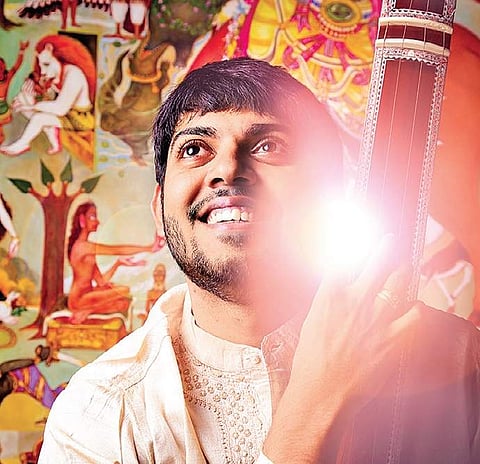

The Margazhi season has evolved over the years. Despite new artistes & concepts, it has retained its traditional value. Upcoming musicians look forward to this season as they get to interact with senior artistes and showcase their talents.
CHENNAI: The curtains will soon go up, caterers will serve hot tumblers of filter ‘Kapi’, ladles of pongal and tiffin and, there will be haunting melodies from aspiring carnatic musicains to some of the world best in the city in December.
The month of Margazhi is not only a time for worship and prayers, but also a season for Carnatic aficionados to get together and enjoy some great music and food. One of the largest cultural events South India, the Margazhi music festival is just around the corner and preparations have commenced across the city. Do the new-age rasikas-cum-performers in the city relate to this? We attempt to find out.
“As a Carnatic musician, the Margazhi season is a special time. So many memories, music and learning is associated with it, and these 30 days were instrumental in shaping my musical interest and career,” says Rithvik Raja, a carnatic vocalist and disciple of TM Krishna.
There’s something for everybody — students get to interact and learn from senior musicians and scholars, there’s a variety of ‘listening opportunities’ across generations for both casual and serious listeners, and many avenues for artistes to present new compositions and musical ideas. “I am caught in the middle, where the student in me wants to be out throughout the day hopping from Sabha to Sabha, while the performer wants to stay at home and focus my energies on practice and performances. But it is also exciting to plan my entire month with only music as the focus!” he smiles.
Has his perception about the festival changed? “I am in awe of the sheer magnitude at which the festival happens each and every year,” he says.
There are positives and negatives everywhere but, a lot has improved over the years and Rithvik says that he’s optimistic about the creative city tag from UNESCO. “It will inspire and motivate organisers, artistes and connoisseurs to improve the overall presentation, aesthetic, infrastructure standards and change the way music is presented and perceived on a global platform,” he opines.
Another budding artiste Janani Rajan, who heads Dwijavanti, a music school, says that Margazhi is more like a wedding celebration. “A lot of things have already changed when it comes to Margazhi. For instance, back then concerts used to be three to four hours long. Now the time duration has reduced and the new artistes get a lesser time slot. But, the essence of Margazhi remains the same and I wish it was celebrated in the old traditional way,” she says.
Rasikas and artistes connect to the art form through the music of the great doyens whose immense contribution left a huge impact on people worldwide. “Many rasikas have listened to this grand generation of Carnatic musicians live, and those who have not, have immersed themselves in it through the numerous recordings available to us today. So, as young musicians, we draw from and look to these stalwarts for inspiration constantly,” shares Vidya Raghavan, a vocalist.
At the same time, the present generation have witnessed new concepts and presentations. “My guru, TM Krishna, has spearheaded many such explorations to very responsive audiences. During the Margazhi season, young musicians like me draw from these experiences, and at the same time try to incorporate and explore new paths that showcase Carnatic music in all its splendour and integrity,” she shares.
Apart from attending kutcheris of veteran musicians, new age performers make it a point in attending concerts of other new artistes, especially thise who come from the US and UK.
The youngsters point to lecture demonstrations and say that it lets them learn a lot about different streams of carnatic music. “There’s no end to learning in Carnatic music. So, I am also looking to learn from new artistes and attend these lectures. Also, the rare pieces of music that are usually labelled ‘not Margazhi-worthy’ should be performed, I feel,” she adds.
For most budding artistes, performing in Margazhi is a ‘hit and miss’, but the experience is all that matters, they opine. “Sometimes stars are made, sometimes it doesn’t workout. But, can we celebrate it in the same old traditional way and not make too many changes? It had captured the attention of the world and it has to be kept intact,” adds Govind Prasad, founder Shree Raga Brainery.